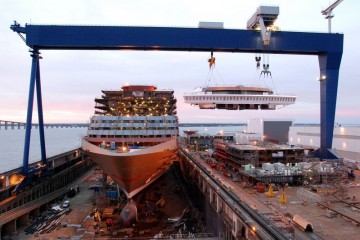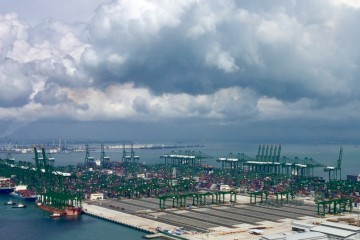One of the biggest political issues of the coming decades is the future of work. Technological advances are such that more than half of the existing jobs could be automated. Automation might create new jobs, but these will very likely not offset the lost jobs. This has far reaching consequences: uncorrected, automation will erode tax income, welfare state and lead to very unequal income distribution. Curiously enough, these issues are mostly absent from current political debate. Could ports move that debate forward?
Ports have been pioneers in automation. Long before it became fashionable to speak about automated driving or autonomous trucks, various ports already had their driverless trucks: the automated guided vehicles. These automation processes, like other productivity enhancing developments such as containerisation, brought employment losses that were dealt with more or less satisfactorily. Most of these transitions were facilitated by sustained trade growth or generous early retirement packages.
Times might be different now. Trade growth is stagnating and will probably never again reach the levels of the last decades. At the same time, robotisation could make more than half of current jobs disappear. Terminal automation in such circumstances might have very different outcomes than in the previous decades – and result in the redundancy of people that are likely not to find another job again.
The business case for automated terminals is facilitated by governments that pick up the bill for the social costs. An important social cost is foregone tax revenues: robots do not pay taxes and do not consume, so they do not create economic growth. There is a limit to the absorption capacity of the state: who pays public services if the robots have taken over all the work? Who will buy the goods if humans have stopped to work? Not surprisingly, the literature on automation frequently suggests to consider introduction of a universal basic income, to be financed by some sort of tax on robots. A recent example of such a plea has come from Bill Gates.
Most ports are public bodies, so they should look at job impacts. Local firms expect the port to be productive, local communities expect it to generate jobs. So any terminal automation project could raise concerns by port authorities, as well as by port-cities and states. Why would it be in their interest to perpetuate a system that favours automation by taxing labour, but not taxing robots? The issue is delicate: we do not want to stifle innovation, yet there might be a real problem with acceleration of automation. This discussion has started, but does not seem to gather much momentum yet. The European Parliament discussed a tax on robots, but decided not to pursue it. The French presidential candidate Benoit Hamon proposed a universal basic income and a tax robots, but his proposal has hardly received attention – and he is currently polling fifth.
Ports could be excellent places to start policy experiments on the taxation of automation. This could help to advance on questions such as: what to tax, how to tax, how to link the tax to education and reconversion of workers, should it be a temporary tax and whom to tax: should there be others than the terminal operators that could contribute to the mitigation of social costs? Ports were at the forefront of automation; they should now be the pioneers in exploring solutions to mitigate the social impacts of automation.
3 Comments
Comments are closed.




Very nice view of the social problem, and a path to consider on the next years when dealing with these aspecs.
[…] Artículo original https://shippingtoday.eu/automation_tax/ […]
Olaf – once again a very thought provoking article. You mention “Ports could be excellent places to start policy experiments on the taxation of automation……” I’m not sure many ports and their customers will wish to be in the vanguard of experimentation. Surely the point of automation is to reduce costs, if there is an additional tax burden it would have to be calibrated so that human labour does not become the cheaper option otherwise further innovation will be stifled . Also, should the debate about how humans should spend their time be a philosophical one and the economics of automation made to fit that outcome, rather than the other way around?